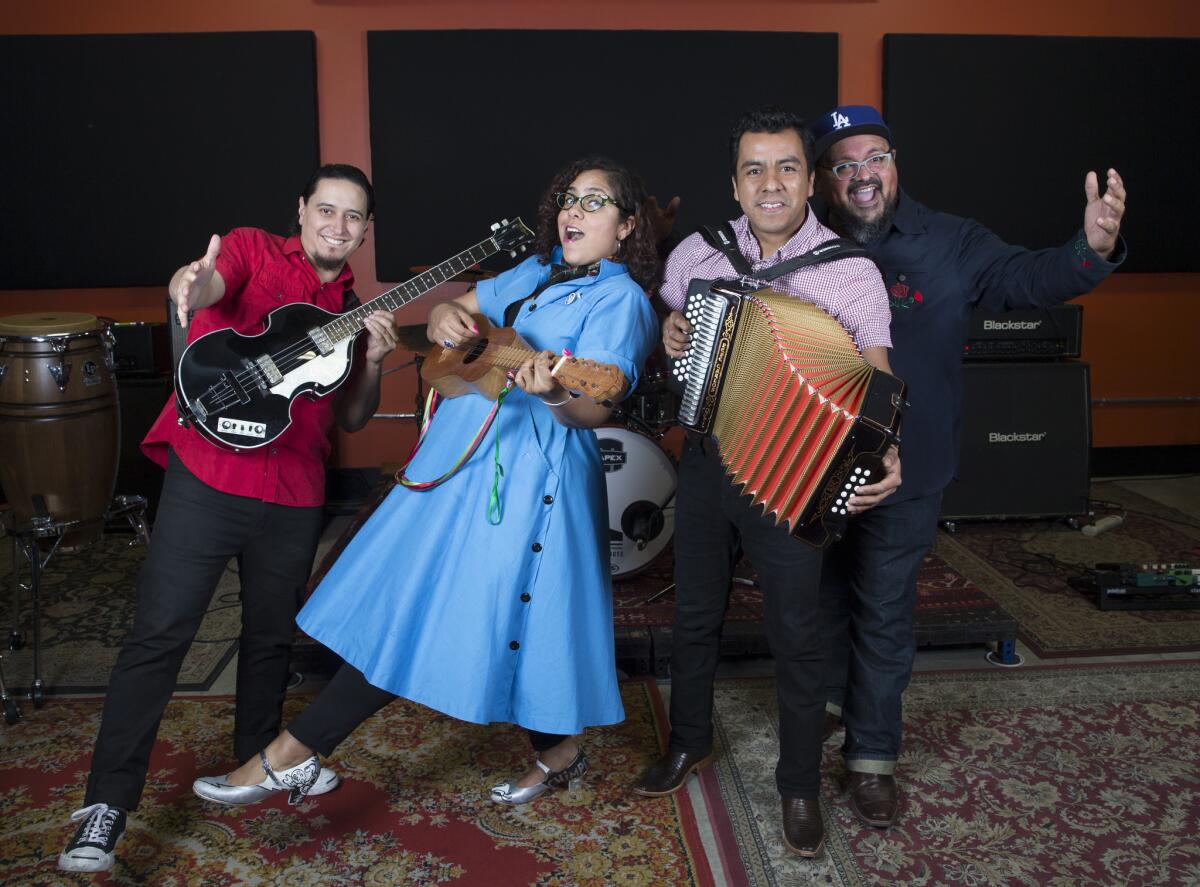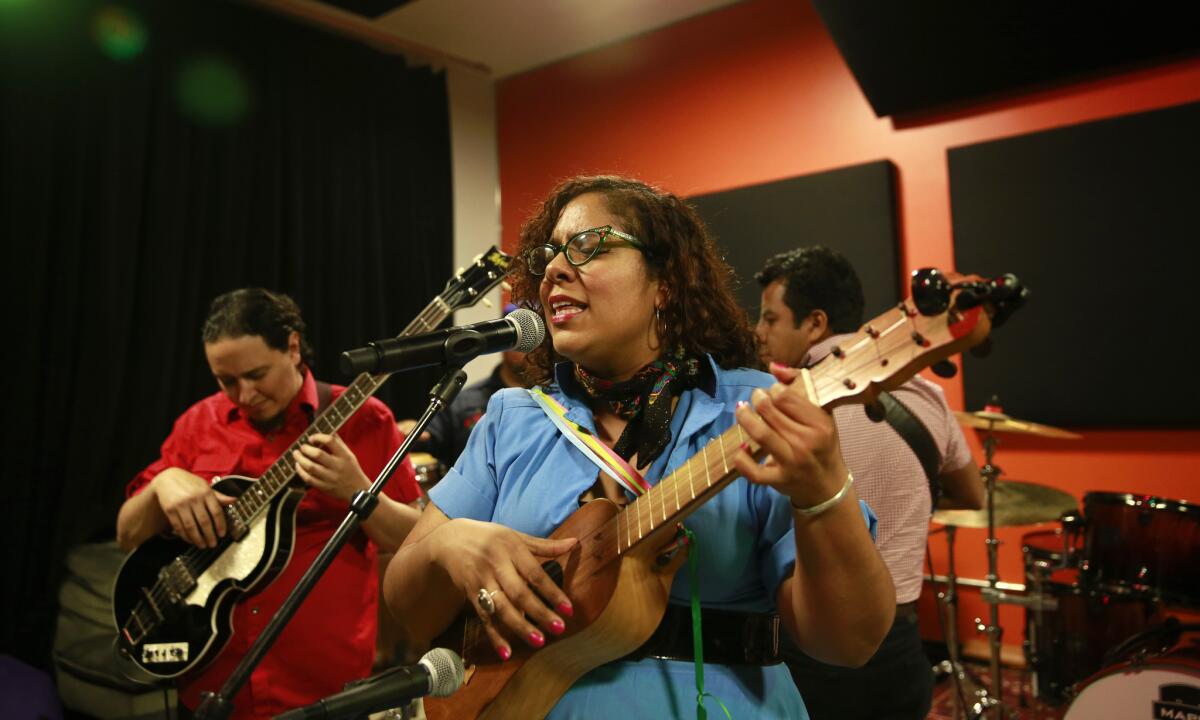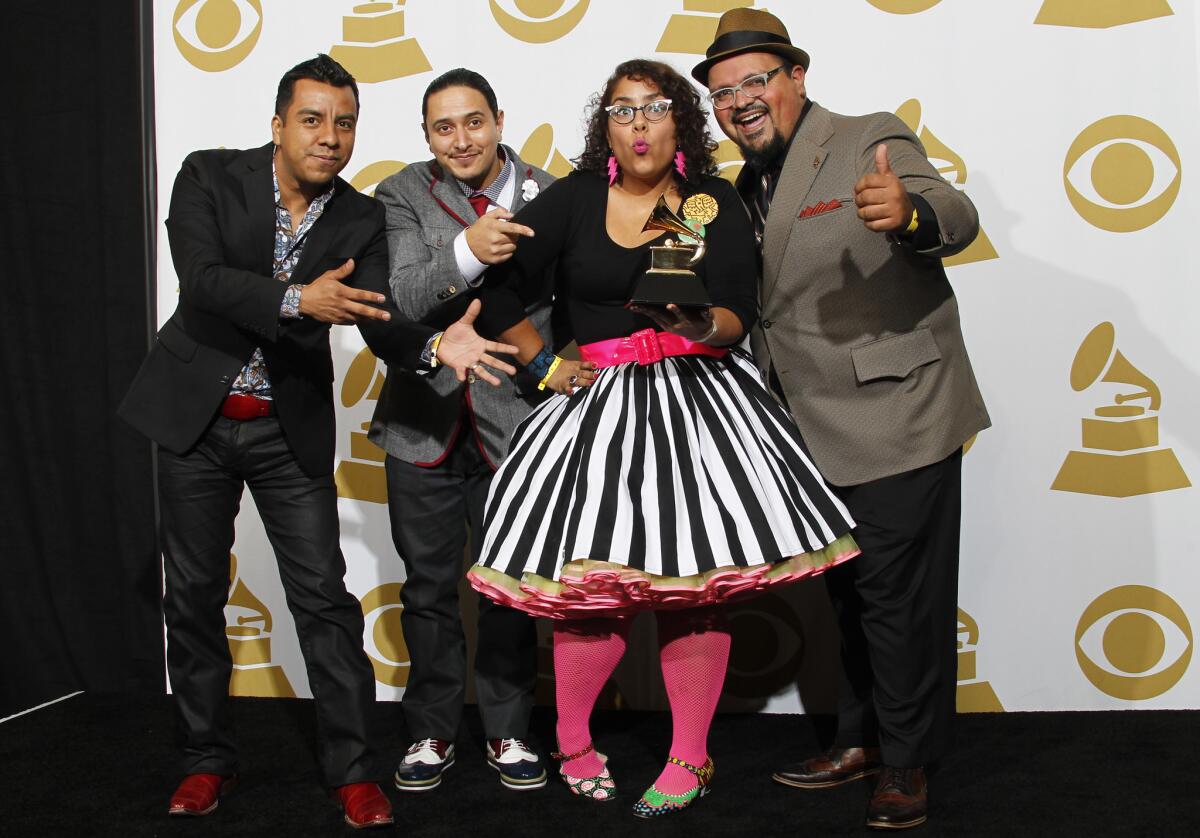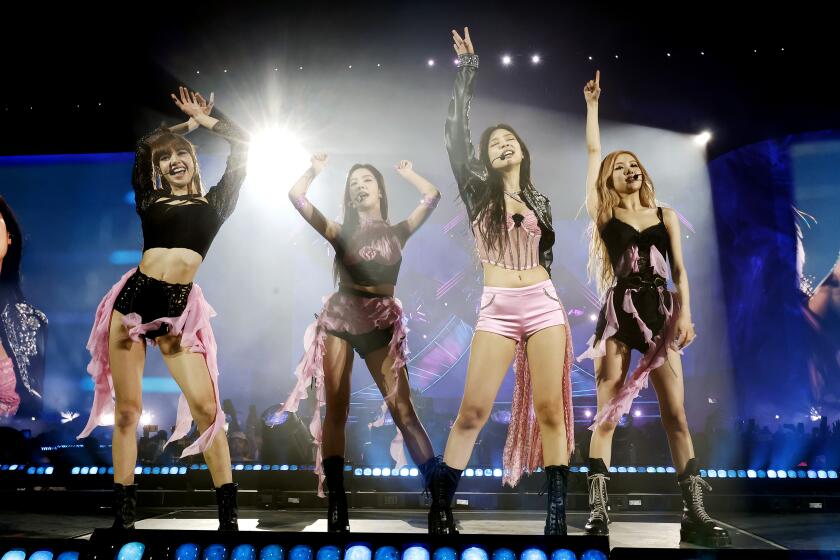A Grammy, a new album, a show at Disney Hall: Next on Santa Cecilia’s wish list is the White House

La Santa Cecilia members from left: bassist Alex Bendaña, vocalist Marisol Hernandez, accordionist Jose Carlos and percussionist Miguel Ramirez.
- Share via
It’s a blustery Tuesday afternoon and the members of La Santa Cecilia are ensconced in a rehearsal room in Atwater Village. The band is working on a piece of the song “Sucede” (It Happens) for their concert Saturday at Disney Hall — their first Los Angeles appearance in more than a year.
The song, like many of Santa Cecilia’s fusion-y hybrids, flits between musical styles — from Latin pop to ska and back again. One transition requires a move from a slower-moving chorus to rapid-fire ska. Trumpet, trombone and accordion players are working on uniting a complex set of fast, fluttering notes.
After attempting various combinations, the band nails it. “Yes, that’s it!” exclaims lead singer Marisol Hernandez, decked out in a bright turquoise 1940s-style house dress and pink huaraches. “¡Así está chido!” (That way, it’s cool.)
The song wraps, Hernandez serves herself a cup of tea and chatter begins about the weekend’s drunken escapades. As the drummer begins knocking out a few beats on his kit, the members slip into impromptu choruses of “Bule Bule,” the 1965 earworm by Los Rockin Devil’s.
Santa Cecilia is enjoying itself to the max. Or, as Hernandez says as she sinks into a couch for an interview, “We are living our dreams.”
The last couple of years have been a whirlwind for the Latin roots-rock band from Los Angeles. Their 2013 album, “Treinta Días” (Thirty Days) won a Grammy Award for Latin rock album, alternative or urban — an honor the band dedicated to the country’s undocumented workers.
Moreover, their single “Ice El Hielo” — a stirring bossa nova set to a powerful video by filmmaker Alex Rivera — generated headlines internationally by showing how families are torn apart by deportation. It led the band to a Capitol Hill immigration rally, where they played before an audience of 100,000. In between, they toured the world.
And the band has remained busy. Late last month, Santa Cecilia released a new album, “Buenaventura,” which quickly landed at No. 3 on the Billboard Latin pop charts. Next week, they launch a tour across the United States and into Latin America.
“It’s been,” says percussionist Miguel “Oso” Ramirez, “just incredible.”

Members of La Santa Cecilia rehearsing for their show at Disney Hall.
When Santa Cecilia takes the stage at Disney Hall on Saturday night, it will represent a long journey yet a short distance from its modest beginnings. Two of the band’s core members — Hernandez, also known as “La Marisoul,” along with accordionist Jose “Pepe” Carlos — got their start busking on Olvera Street, just a mile from Disney Hall.
They officially became La Santa Cecilia roughly eight years ago, when Hernandez and Carlos joined Ramirez and bassist Alex Bendaña. Since then, they have made a national name for themselves with their stew of Latin-infused sounds, tunes that deftly blend norteño, ska and rock for songs that are greater than the sum of their parts.
“Cumbia Morada,” one of the breakout songs from their 2014 album, “Someday New,” synthesizes cumbia and pop. The girl-power anthem, “I Won’t Cry For You,” from their current album, takes swing and injects it with accordion. (Impossible not to groove to.)
“It’s this natural way of doing a collaboration,” says Ramirez. “For us, it’s, ‘What if we mix cumbia with reggae?’”
And it’s a process where no one person dominates. “We are a band when it comes to songwriting,” Ramirez says. “I’ll come by with something, with the beginning of a song, and somebody else will add to it.”
“It’s always a challenge,” adds Bendaña. “How do you make the music evolve? ... We all feed off each other’s ideas.”

La Santa Cecilia after their 2014 Grammy win for Best Latin Rock, Urban or Alternative Album.
Certainly, the band itself represents a unique fusion of Latin styles — an L.A. band that could not be more of L.A. All hail from different parts of the city and, together, cover a range of Latino experience.
Hernandez and Ramirez both have Mexican roots but were born in the U.S. Bendaña is Nicaraguan but was born in Venezuela before his family moved to L.A.
Carlos, as has been widely reported, was brought to the U.S. as a boy from the Mexican state of Oaxaca and was undocumented until 2014 — when he was approved for a green card in the wake of the band’s Grammy win.
“So many dreams are held up by a card,” he says. “We contribute to everything that is going on here. So it was incredible to finally be able to travel with the band, to finally go to Mexico, to Colombia. It was amazing.”
The variety of musical experiences that Santa Cecilia’s members collectively represent are equally intriguing. Bendaña got his start when a childhood friend, who was Mexican, asked him if he was interested in playing music — and taught him the polka-based basics of norteño.
“A week later I’m playing this gig at this party,” he recalls with a chuckle, “wearing a scorpion belt.”
Bendaña and Ramirez came together over their shared love of Afro-Caribbean beats. Carlos is obsessed with norteño. Hernandez has an abiding infatuation with son jarocho (the fast-moving, string-heavy style from Veracruz) and nueva canción, the folk-political anthems that emerged out of Latin America in the ‘70s.
“I grew up listening to Mercedes Sosa,” she says of the renowned Argentinean folk singer. “I remember my dad calling me into the house and saying, ‘Listen to this.’ And he put on ‘Alfonsina y el Mar’ and the lyrics and her voice — it just stayed with me.”

But though the group has always found an easy synthesis among their disparate interests — including good doses of rock, pop and country, from the Doors to Loretta Lynn — the creation of the “Buenaventura” album was different from the others. Their higher profile kept them on the road for months at a time, and when they returned to Los Angeles, they were overwhelmed by personal and professional obligations.
“In the past, we sat around writing songs, that’s what we did,” Hernandez says. “This time we had to make time to write.”
To that end, Hernandez rented a house in Joshua Tree so that the band could get away as a unit. She also enforced some strict rules.
“Our phones were kept in a drawer,” Ramirez recalls with a smirk. “And we could only check them for 20 minutes a day.”
Initially, coming together to write after so much time on the road didn’t come naturally.
“I wasn’t feeling it,” says Ramirez. “I said, ‘I’m going to go make meatball soup.’”
But Carlos says that is part of the band’s dynamic. “Sometimes, you have to let it be.”
As they began to disconnect from the frenzy of being Santa Cecilia, however, they began to reconnect musically.
“Buenaventura” traipses effortlessly across genres. “Sacude la Pereza” channels a chilled-out reggae beat. The politically tinged “Nunca Más” takes its high energy from the blazing strings of son jarocho. And “Tragos de Amargo Licor,” done in collaboration with Spanish rocker Enrique Bunbury, is a rock-infused cover of the heartbreak song by norteño legend Ramón Ayala — the sort of tune to drink one or two or three tequilas to.
The fusion comes naturally, something that the band’s members attribute partly to their years as a party band — playing locations such as La Cita, the downtown bar where they were known to get a crowd moving back in the mid-aughts.
“If someone says, ‘Can you play another hour?’ — you say yes,” says Hernandez.
“And if you don’t have songs, you inventa,” she adds, using the Spanish word for invent.
The mixing also fulfills a desire not to be pigeonholed into any one genre.
“Sometimes we are like, ‘I want to be in a rock band’ and sometimes we say, ‘I want to play in a cumbia band,’” says Hernandez.
“We are doing our thing,” adds Carlos, “and not classifying it in any way.”
As the band gets ready to globe-trot again, there are still plenty of things they dream about doing. They’d like to spend more time in Colombia, land of the cumbia, and perhaps make a visit to Peru, with its psychedelic chicha music.
Plus, there’s a joint in Washington, D.C., they are interested in playing.
“The White House has mad concerts,” says Ramirez. “If Obama would like to book us before he goes, we’re available.”
La Santa Cecilia plays Walt Disney Concert Hall on Saturday at 8 p.m. Spanish singer Buika is the opening act. 111 S. Grand Ave., downtown Los Angeles. Tickets are $48.50 to $114. laphil.com.
Find me on Twitter @cmonstah.
More to Read
The biggest entertainment stories
Get our big stories about Hollywood, film, television, music, arts, culture and more right in your inbox as soon as they publish.
You may occasionally receive promotional content from the Los Angeles Times.











